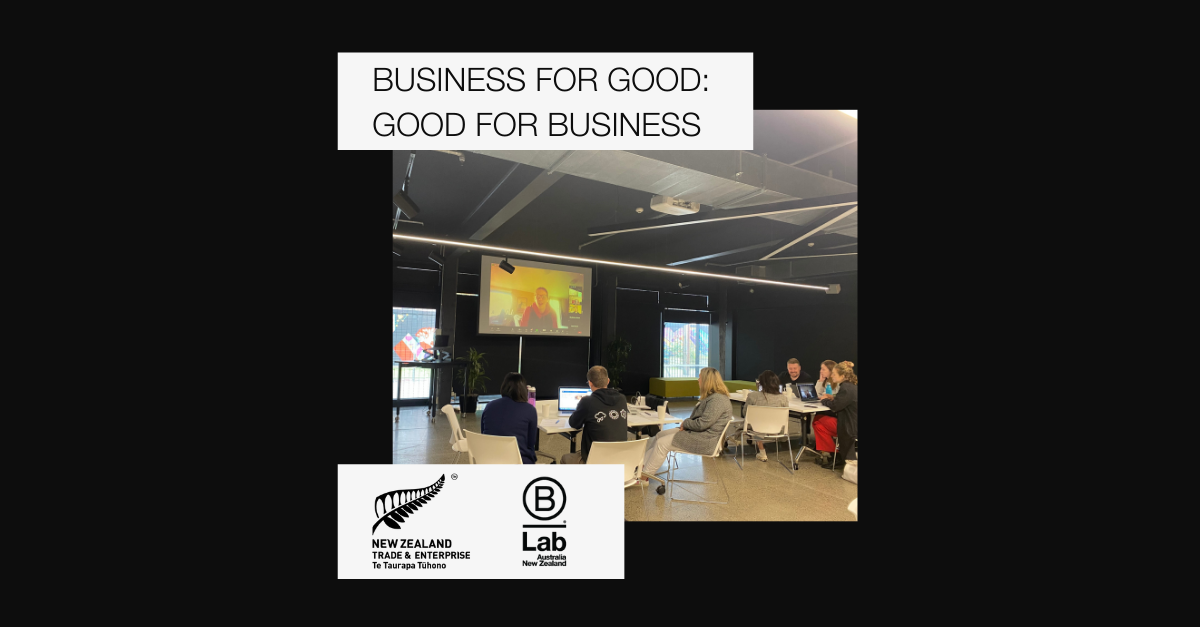Earlier this year, B Lab Australia & Aotearoa New Zealand partnered with the sustainability team at economic development and trade promotion agency New Zealand Trade and Enterprise (NZTE). Together, we piloted the ‘Business for Good: Good for Business’ program.
The Business for Good pilot sought to help companies create an action plan and improve their impact using a range of tools, including the B Impact Assessment and B Corp best practice guides. Businesses learned directly from Certified B Corporations and received tailored guidance from a dedicated B Consultant. With two cohorts now completed, we reflected on the partnership with NZTE to share learnings so others can replicate the program.
How Business for Good started
New Zealand Trade and Enterprise works with a number of New Zealand-based exporters with the ambition of demonstrating best practice in their approach to sustainability. When talking with these businesses, the agency found its staff referring to the B Impact Assessment regularly as a valuable self-assessment tool and B Corp certification as the ‘gold standard.’ “We could see the momentum that B Corp was gaining around the world,” said Grace Ashman, Sustainability Lead at NZTE. “We were keen for more New Zealand companies to be part of the movement.”
While co-designing the program, NZTE and B Lab drew inspiration from similar initiatives overseas such as Scotland CAN B and Swiss Triple Impact – both of which focused on impact improvement of businesses and their contribution to society, as opposed to certification itself. “This was something we were keen to ensure too,” said Jo Kelly, Strategic Advisor for B Lab Australia & Aotearoa New Zealand. “Deeper, more meaningful impact is the goal, and certification is just one of many tools.”
After deciding to pilot the program with consumer goods businesses, the concept was introduced through a webinar where organisations were invited to apply. Not only was demand enough to fill the pilot, but it led to an additional intake: two cohorts of about twenty businesses each.
“We were blown away by the level of interest in the program,” said Grace. “It was such a positive but unexpected outcome.”

Outcomes of the pilot
By leveraging existing tools and a network of B Corps, the Business for Good pilot was designed to support companies to validate and demonstrate their sustainability progress, while also demystifying impact improvement by showing it in practice. “We wanted to help businesses link their values and purpose to impact,” said Chris Lijzenga, Sustainability Advisor at NZTE. “By identifying areas for innovation and growth, we also hoped to give them the tools to increase resilience. Articulating their sustainability story is also critical in building trust from customers and employees.”
Many of the businesses were inspired by B Corps like Fix & Fogg, Raglan Food Company, Synlait, and Eagle Protect as they reflected on their impact journey, particularly in how it related to exporting. The participants also received one-on-one support from local B Consultants to understand each business’ unique challenges.
“Many of the businesses highlighted the value of being part of a cohort,” Chris reflected. “Across the group, there were shared challenges and opportunities to learn from one another, which is always really powerful. We hope those connections continue on past the program itself.”
The cohorts also had the opportunity to build their impact community at in-person networking sessions with B Corps like Sawmill, Brightly, and thinkstep-anz in Auckland. “This was a great opportunity for Business for Good participants to connect the broader B Corp movement and soak up learnings and advice,” said Grace.

Learnings for the future
With the pilot program wrapped, B Lab and NZTE are exploring ways to share the experience and learnings with other government agencies. “We think a ‘Business for Good’ style cohort experience can work anywhere in the world,” Grace explained. “We chose to focus on companies in our portfolio already so we could tailor the content to participants, but the program and B Lab’s tools can really work for any business, no matter the size, scale, and location.”
“One element that we did consider deeply was integrating Māoritanga into the program, as it is an integral part of New Zealand’s identity and culture.”
“We would recommend any government consider what they can learn from Indigenous cultures about sustainability, as well as how to make programs like this inclusive and relevant for businesses of these communities.”
Although the B Corp movement originated in the United States, the growing global movement is helping to introduce new perspectives, including Indigenous approaches to the people, place, and communities.
“The B Corp Declaration of Interdependence relates really well to many of the principles we observe in Māori and sustainability-focussed businesses in New Zealand,” said Chris. “It has been great to surface some of the regional nuances through the program. Nonetheless, the great thing about the B Impact Assessment is that it is flexible enough to enable businesses to determine their own values, then give guidance and tangible steps towards connecting them to decision-making.”
As the global business community begins to shift towards stakeholder governance and impact management, the drivers in this shift vary for each business. “It may be consumer choices, capital markets, talent, or the inherent values and purpose of the business,” Chris explained. “Whatever the reason, we want New Zealand businesses to be well-equipped to make positive changes and bring their best to the global marketplace.”
“With the right tools and support from partners like B Lab, we think that New Zealand businesses can have a positive social and environmental impact, be more resilient and stronger performers – and that has huge upsides for the New Zealand economy, our communities, and our regions, as well as New Zealand’s presence and success in global markets.”
Thank you again to New Zealand Trade and Enterprise, and the B Corps and B Consultants who supported the Business for Good: Good for Business pilot.

